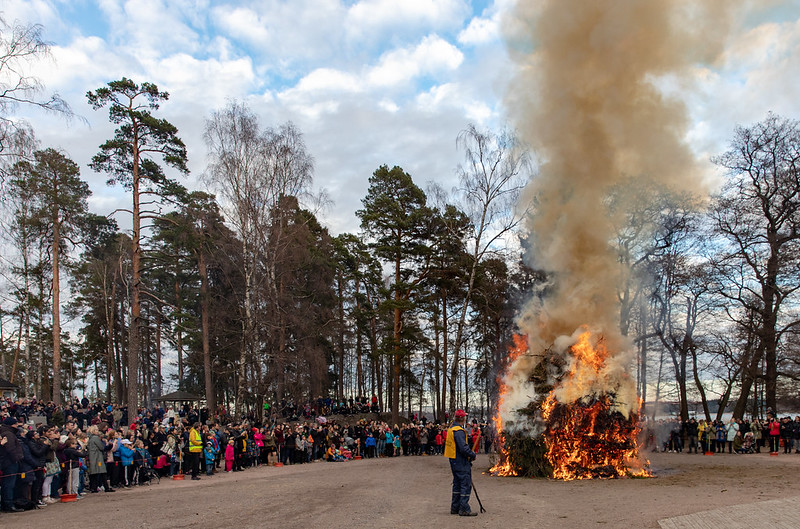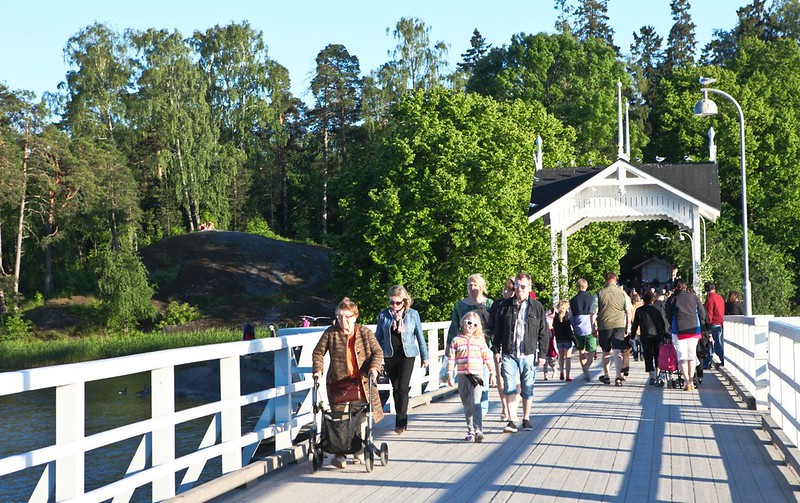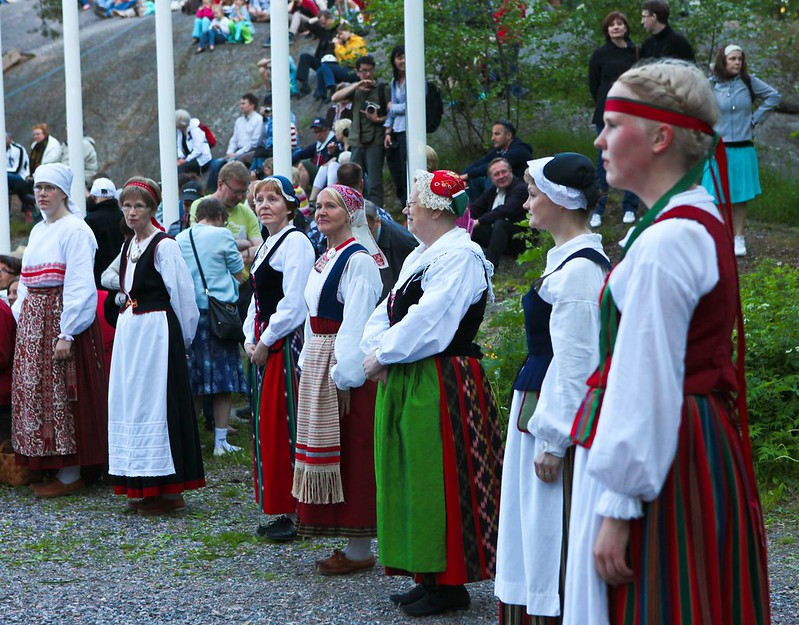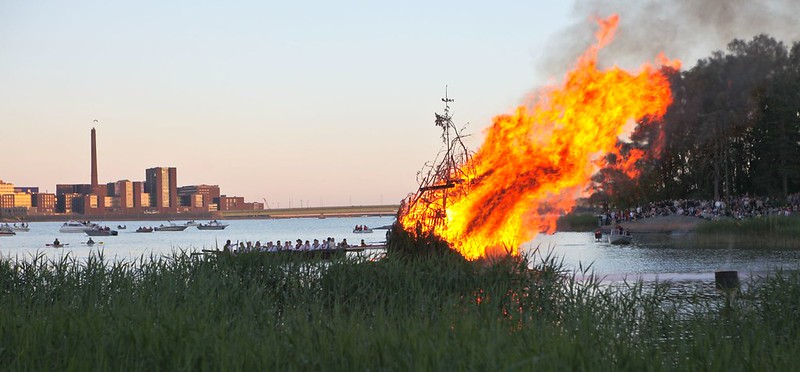Seurasaari Midsummer Bonfires
A Magical Night of Finnish Tradition
2026/06/18
As the sun lingers on the horizon, casting a golden glow over the serene landscape of Seurasaari Island, thousands of people gather to celebrate the enchanting Midsummer bonfire. This festival, held annually on Midsummer Eve in late June, transforms the island into a living stage where Finnish folklore and traditions come to life. Under the bright night sky, the unique atmosphere created by old farmhouses, people in traditional costumes, and the blazing bonfire attracts visitors from near and far. Visitors can directly experience Finland's cultural heritage while enjoying traditional music and dance, craft demonstrations, and local cuisine.
Main Attractions
The Grand Bonfire
As twilight approaches and the air fills with anticipation, all eyes turn to the shoreline where the grand bonfire, known as Kokko, awaits ignition. Standing over 10 meters tall, this carefully constructed pyre of birch logs and branches is a testament to Finnish craftsmanship. At precisely 10 PM, flames leap skyward, their warmth embracing the crowd as sparks dance against the twilight sky. The crackling of the fire mingles with gasps of awe, creating a mysterious symphony that echoes across the island.
Folk Dancing and Music
The island comes alive with the rhythmic stomping of feet and the lilting melodies of traditional Finnish folk music. Dancers in vibrant red, blue, and white costumes twirl and leap in intricate patterns. The haunting sounds of the kantele, a traditional Finnish string instrument, float on the breeze, transporting listeners to a bygone era. Visitors are encouraged to join in, their laughter blending with the music as they attempt to master the steps of simple folk dances.
Traditional Crafts and Demonstrations
Throughout the night, skilled artisans demonstrate centuries-old crafts. The air is filled with the sharp tang of wood smoke and the earthy scent of leather as visitors watch blacksmiths forge intricate ironwork and cobblers craft traditional shoes. The soft whir of spinning wheels accompanies demonstrations of wool spinning and weaving, while the delicate aroma of birch leaves wafts from stations where visitors can learn to make their own vihta, the traditional sauna whisk.
The Midsummer Feast
No Finnish celebration is complete without a lavish feast. Long tables groan under the weight of traditional Midsummer delicacies. The star of the show is the new potatoes, their skins so delicate they can be rubbed off with a thumb, served with dill and melted butter. Platters of gravlax, its flesh a deep pink and glistening with herbs, sit alongside bowls of creamy herring salad. The air is perfumed with the smoky aroma of grilled sausages and the sweet scent of freshly picked strawberries, the quintessential taste of Finnish summer.
Cultural and Historical Background
The Seurasaari Midsummer Bonfire celebration was first organized in 1954, born out of a desire to preserve and showcase Finnish Midsummer traditions. The festival found its permanent home on Seurasaari island, an open-air museum established in 1909 to preserve traditional Finnish ways of life.
For Finns, this event embodies more than just a festival. It represents a living connection to their traditional culture. In a rapidly modernizing world, the Seurasaari Midsummer Bonfire offers a valuable opportunity to reconnect with ancient customs and the rhythms of nature. The celebration of Midsummer, or Juhannus, has roots in pre-Christian times when it was believed that magic was especially powerful during the summer solstice. Today, while many of the old beliefs have faded, the festival remains an important occasion for Finns to honor their ancestors' wisdom and celebrate the fleeting beauty of the Nordic summer. It's a place to reaffirm traditions and values passed down through generations and to vividly experience them in modern life.
Participants Voices
I've always celebrated Juhannus at our family's summer cottage, but this year I decided to experience Seurasaari. I'm so glad I did! The atmosphere was incredible – it felt like stepping into a living history book. I tried my hand at traditional rope making and ended up chatting with an elderly craftsman who shared stories of his childhood Midsummers. The highlight was definitely the bonfire. Standing there, surrounded by strangers who quickly became friends as we sang traditional songs, I felt a deep sense of connection to my Finnish roots. It's a night I'll never forget.
Fun Facts
- The Seurasaari bonfire is often built on a raft and floated out onto the water before being lit, creating a stunning reflection on the calm sea.
- In 2019, over 10,000 visitors attended the Seurasaari Midsummer celebration, making it one of the largest traditional Midsummer events in Finland.
- The festival features a traditional "raising of the maypole" ceremony, a custom more commonly associated with Swedish-speaking regions of Finland.
- Seurasaari is home to the oldest building in Helsinki, the Karuna Church, built in 1685, which is specially opened for visitors during the Midsummer celebration.
- The festival's commitment to authenticity extends to the performers' costumes, many of which are painstakingly recreated from historical records and can take months to complete.
Festival Dates
The Seurasaari Midsummer Bonfire is traditionally held on Midsummer Eve.
The event schedule is subject to change. Please check the official website for the most up-to-date information.
Information
| Name | Seurasaari Midsummer Bonfires |
| Country | Finland |
| Area | Helsinki, Seurasaari |
| Date | 2026/06/18 |
| Link |
Upcoming Festivals
Kukeri(Surva) Bulgaria
Bulgaria’s Festival of Spirits, Fire, and Bells That Drives Away Winter
2026/01/22Dinagyang Philippines
Iloilo’s Thunderous Festival of Faith, Tradition, and Dance
2026/01/22The Northern Lights Festival (Nordlysfestivalen) Norway
A Tromsø Miracle: Music and Aurora Dancing in the Arctic Night
2026/01/25Carnavales de Ituren y Zubieta Spain
Ancient Echoes and the Festival that Awakens Spring in the Basque Mountains
2026/01/26Up Helly Aa United Kingdom
A Night When Fire and Viking Pride Blaze in Shetland
2026/01/29Winterlude Canada
A Wonderland of Ice, Light, and Smiles in Canada’s Capital Region
2026/01/30Carnival of Viareggio (Carnevale de Viareggio) Italy
A Spectacular Parade of Giant Papier-Mâché Masterpieces
2026/01/30Fiesta de la Candelaria(Virgin of Candelaria) Peru
A Grand Dance Festival of Faith and Folklore Echoing on the Shores of Lake Titicaca
2026/01/31Thaipusam Malaysia
A Pilgrimage of Prayer and Penance Illuminates Batu Caves
2026/01/31Jaisalmer Desert Festival India
When Rajasthan’s Golden Dunes Dazzle with Color and Culture



